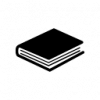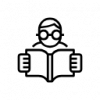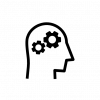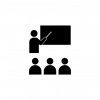I undertake continuous review and improvement of all my teaching activities and the courses I convene based on self-reflection, knowledge gained from literature and education forums, seminars and conferences, and student feedback.
PHAR3101 Drug Drug Discovery Design and Development (2017-2022)
I revitalised this course by updating the course materials and assessment tasks when I took over as convenor in 2017. Including adding a focus on the role of teamwork in the pharmaceutical industry and careers in the pharmaceutical industry. These additions are aimed to provide important professional skills and exposure to a diversity of career options. The overall satisfaction score for PHAR3101 increased from 4.69 in 2016 to 5.25 in 2017.
Student comment MyExperience 2017: The relevance to entering the workforce and the way the industry functions was invaluable. This course was very interesting and all information that was learnt was shown in context to show how important it is. This is particularly great given this course is 2nd semester course in the 3rd year, after which many students will be either starting to look for graduate jobs or will be going into the workplace (I myself am in the process of these decisions so really appreciate the extra info) I also really enjoyed the assessments, each one posed a new and intriguing challenge without increasing the workload by too much. The ability to hear from researchers and workers in the field was also a unique and awesome opportunity that I have only ever experienced in this course, it made sure the content we were receiving was relevant and current. I really enjoyed this course and feel that not only was the structure and format perfectly devised but the lecturers were very well organised and I learnt a lot that I will 100% be bale to use in my career in pharmacology.
In 2018, PHAR3101 (semester 2 2017 delivery) was randomly chosen for the Group of Eight Quality Verification System (QVS). The Go8 QVS is a process of external, discipline-led, academic peer review of final-year undergraduate student outcomes. The QVS reviews two core subjects in undergraduate programs across each of the Go8 universities. QVS examines the appropriateness and comparative quality of the specified learning outcomes, assessment tasks, assessment criteria and assessment processes set for samples of final-year subjects, and the appropriateness of the grades awarded to stratified random samples of student work.
QVS rated the extent to which the course met each of the criteria examined as 'very well' or 'completely' and the learning outcomes, assessment tasks and assessment processes were deemed appropriate.
In 2019 the assessment tasks were revised with the aim to make them more authentic. For example, the written laboratory assessment task which had previously been in the format of a research manuscript was changed to a technical report as is used in industry to report on research findings internally in companies or to communicate findings to clients by research contract organisations. I consulted with people working in the pharmaceutical industry to design the format of the report to reflect what is used in practice. I also developed an online module to provide guidance to the student on how to write a technical report.
Student comments myExperience 2021: ‘ I also like the idea of the technical report! ‘, ‘I was quite happy with the number of resources provided for the technical report.’
In 2021 to increase student engagement an immersive approach to the delivery of the course was adopted. This involved the whole course being taught “inside” a scenario. This scenario was that the students were graduate interns in a company called Somsceuticals and each week they were doing a rotation in a different department of the company and the learning and assessment tasks were set by the leads of each department.
Student comments myExperience 2021: “Simulating a mock pharmaceutical company was definitely different but I think it works really well. It ties together the course content and assessment tasks very well.” , “I liked how the course was set up so we were 'interns', it made it more fun!”
In 2022 a new set of practical classes were developed. I undertook the development of these practicals to address student feedback comments regarding difficulties in understanding and applying some aspects of the lecture material regarding the development and use of assays and high-throughput screening (HTS). To address this feedback a two-part practical was developed. In part one, “Assay optimisation”, each student team conducted an assay with one experimental parameter varied, for example, enzyme concentration, substrate concentration, buffer pH, cation concentration etc. The data collected was collated and each team then developed a HTS validation assay protocol based on the class data. This assay was conducted in the next practical class and the data from this, and the optimisation assay were written up as the technical report task.
2022 unsolicited email from student: “…as difficult as this was initially, it was really fun to come up with a protocol and really helped solidify my understanding of everything you spoke about in the lecture, so thank you for this opportunity!”




